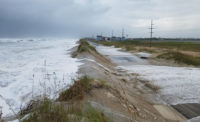Expert crews are rappelling down a steep wall of jagged, unstable rocks above Interstate 40 in western North Carolina, beginning the cleanup and repair process of an Oct. 25 rockslide that shut the highway down. The repair could take four months and cost $10 million.
The 500,000-ton rockslide on U.S. Forest Service land caused the North Carolina Dept. of Transportation to declare an emergency and Gov. Beverly Perdue (D) has asked the U.S. Dept. of Transportation to declare the rockslide a federal disaster area.
Crews with contractor Phillips & Jordan Inc., Knoxville, Tenn., are working with rock stabilization specialists from Janod Inc., Champlain, N.Y., at the site, which is three miles from the Tennessee border. The 150-ft-tall, 300-ft-wide slide zone is still unstable, making the cleanup process extremely hazardous.
“We looked for experience�people who could do a good job and had equipment close by,” says NCDOT spokesperson Nicole Meister, adding that P & J cleared another massive rockslide about a mile away in 1997. P & J and Janod declined to comment.
NCDOT’s three-phase cleanup plan consists of removing the debris, which includes cottage-sized boulders that must be blasted, and the remaining unstable rock from the lower and middle sections of the slide area; using that rock to make a ramp so that specialty drilling equipment can reach the top of the slide via a pulley system; and finally, stabilizing the slope using chiseling and blasting. NCDOT typically builds a road to transport equipment to the top of a rockslide. That approach was rejected due to the steepness and other logistical challenges, as was a plan to use helicopters to lift equipment to high points on the gorge wall. “Figuring out how to get the equipment to the top of the slide was probably the biggest of many challenges, at least so far,” says Meister.
Experts are analyzing each boulder and section of rock to determine if it is secure or needs to be removed. The area above the rockslide will also be stabilized. Once the whole slope is cleared and stabilized, NCDOT plans to place temporary asphalt to get traffic moving again until permanent asphalt can be placed, probably in late spring.
Projected time frames and costs for the cleanup and repair could change as the work progresses and winter hits, says Meister. That mountainous stretch of I-40 is often closed due to winter weather.
Geotechnical engineers have not yet determined the cause of the rockslide. Much of the Pigeon River Gorge in Haywood County is comprised of rock that is prone to breaking up. Possible causes of the slide include tremors and freeze-thaw cycles at key points called wedges, where layers of rock come together at an angle. There have been at least 10 rockslides along I-40 since 1972. A 1985 slide closed the road for more than six months.



Post a comment to this article
Report Abusive Comment